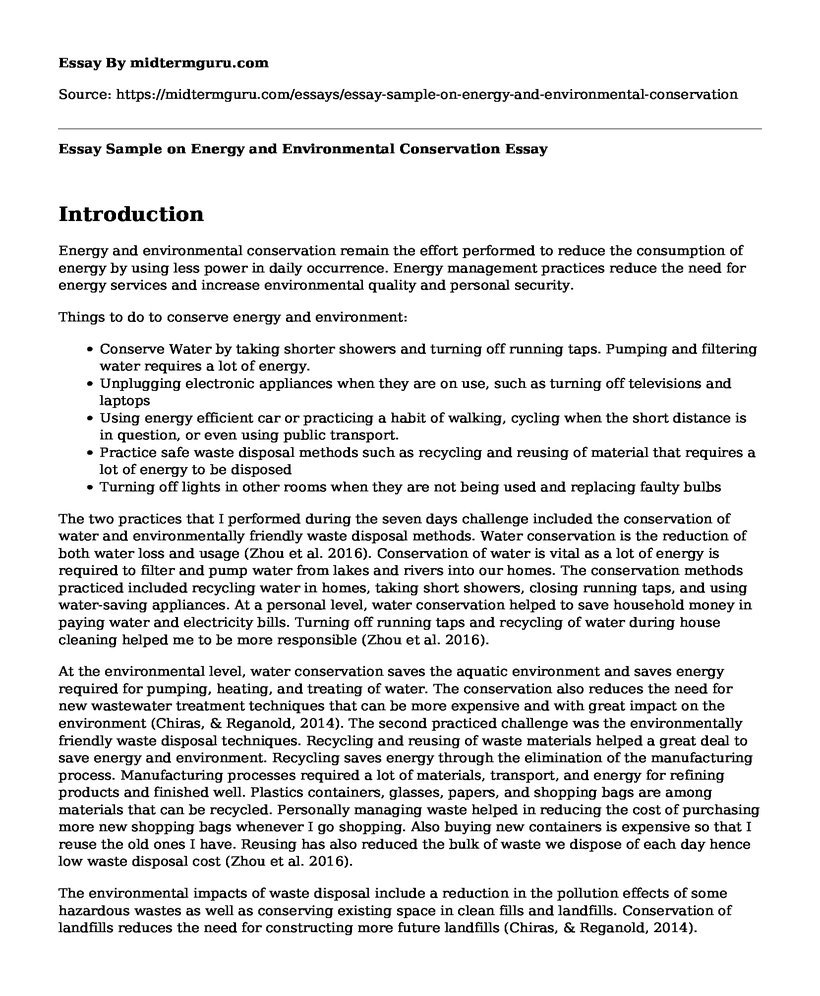Introduction
Energy and environmental conservation remain the effort performed to reduce the consumption of energy by using less power in daily occurrence. Energy management practices reduce the need for energy services and increase environmental quality and personal security.
Things to do to conserve energy and environment:
- Conserve Water by taking shorter showers and turning off running taps. Pumping and filtering water requires a lot of energy.
- Unplugging electronic appliances when they are on use, such as turning off televisions and laptops
- Using energy efficient car or practicing a habit of walking, cycling when the short distance is in question, or even using public transport.
- Practice safe waste disposal methods such as recycling and reusing of material that requires a lot of energy to be disposed
- Turning off lights in other rooms when they are not being used and replacing faulty bulbs
The two practices that I performed during the seven days challenge included the conservation of water and environmentally friendly waste disposal methods. Water conservation is the reduction of both water loss and usage (Zhou et al. 2016). Conservation of water is vital as a lot of energy is required to filter and pump water from lakes and rivers into our homes. The conservation methods practiced included recycling water in homes, taking short showers, closing running taps, and using water-saving appliances. At a personal level, water conservation helped to save household money in paying water and electricity bills. Turning off running taps and recycling of water during house cleaning helped me to be more responsible (Zhou et al. 2016).
At the environmental level, water conservation saves the aquatic environment and saves energy required for pumping, heating, and treating of water. The conservation also reduces the need for new wastewater treatment techniques that can be more expensive and with great impact on the environment (Chiras, & Reganold, 2014). The second practiced challenge was the environmentally friendly waste disposal techniques. Recycling and reusing of waste materials helped a great deal to save energy and environment. Recycling saves energy through the elimination of the manufacturing process. Manufacturing processes required a lot of materials, transport, and energy for refining products and finished well. Plastics containers, glasses, papers, and shopping bags are among materials that can be recycled. Personally managing waste helped in reducing the cost of purchasing more new shopping bags whenever I go shopping. Also buying new containers is expensive so that I reuse the old ones I have. Reusing has also reduced the bulk of waste we dispose of each day hence low waste disposal cost (Zhou et al. 2016).
The environmental impacts of waste disposal include a reduction in the pollution effects of some hazardous wastes as well as conserving existing space in clean fills and landfills. Conservation of landfills reduces the need for constructing more future landfills (Chiras, & Reganold, 2014). Recycling of plastics and metals also maintain the beauty of our environment because such materials do not decompose.
The original quiz focused more on unplugging electronic devices and changing the transport mode by walking or cycling to school. Unplugging electric devices conserved domestic energy at household level by reducing the energy consumption cost as well as reducing energy production cost (Zhou et al. 2016). Walking or cycling to school was aimed at reducing pollution of carbon to the atmosphere. This practice can be very useful in mitigating climate change and personally in keeping fit. When the original and second quiz results are compared, it is evident that both practices are aimed to conserve energy and the environment. Energy and environment conservation is an essential topic that should be practiced at the individual level to make the world safe for all species (Zhou et al. 2016). The small habits practiced at personal, and household levels can save the earth. I will continue to practice the two lifestyle changes for the better of the environment and urge other students to do the same and save our energy and environment.
References
Chiras, D. D., & Reganold, J. P. (2014). Natural resource conservation: management for a sustainable future. Pearson/Prentice Hall.
Zhou, B., Li, W., Chan, K. W., Cao, Y., Kuang, Y., Liu, X., & Wang, X. (2016). Smart home energy management systems: Concept, configurations, and scheduling strategies. Renewable and Sustainable Energy Reviews, 61, 30-40.
Cite this page
Essay Sample on Energy and Environmental Conservation. (2022, Sep 07). Retrieved from https://midtermguru.com/essays/essay-sample-on-energy-and-environmental-conservation
If you are the original author of this essay and no longer wish to have it published on the midtermguru.com website, please click below to request its removal:
- Defining What Is Water Essay Simple
- The Importance of Turkey in Energy Hubs and Renewable Energy
- Annotated Bibliography on Volkswagen Emissions Scandal
- Article Analysis Essay on Effects of Glaciation
- Paper Example on Lifestyle Practices That Pose a Risk to a Person's Wellbeing
- Clean Water: Essential for Life, Yet Neglected by Many - Research Paper
- Aviation and Climate Change: Arguments and Consensus - Essay Sample







